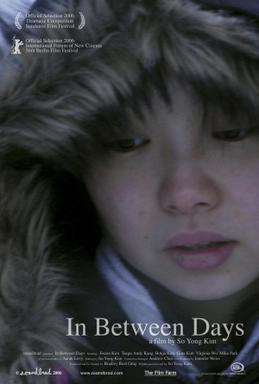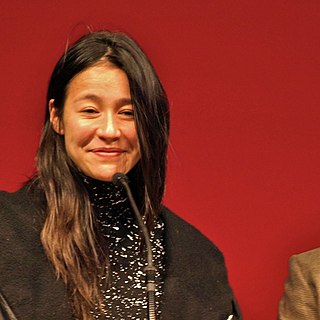
Better Luck Tomorrow is a 2002 American crime-drama film directed by Justin Lin. The film is about Asian American overachievers who become bored with their lives and enter a world of petty crime and material excess. Better Luck Tomorrow introduced film audiences to a cast including Parry Shen, Jason Tobin, Sung Kang, Roger Fan, and John Cho. The film was based loosely on the murder of Stuart Tay, a teenager from Orange County, California, by four Sunny Hills High School honor students on December 31, 1992.
Miguel Arteta is a Puerto Rican director of film and television, known for his independent film Chuck & Buck (2000), for which he received the Independent Spirit John Cassavetes Award, and for the films The Good Girl (2002) and Cedar Rapids (2011).

The Hole, also known as The Last Dance, is a 1998 Taiwanese drama-musical film directed by Tsai Ming-liang. It stars Yang Kuei-mei and Lee Kang-sheng.
Matthew Greenfield is the president of Searchlight Pictures, which has produced five Best Picture winners, including Slumdog Millionaire, Birdman, 12 Years a Slave, The Shape of Water, and Nomadland. Greenfield and fellow Searchlight president David Greenbaum started Searchlight Television in 2018.

Justin Lin is a Taiwanese-American film director. His films have grossed US$2.3 billion worldwide as of March 2017. He is best known for his directorial work on Better Luck Tomorrow (2002), the Fast & Furious franchise from The Fast and the Furious: Tokyo Drift (2006) to Fast & Furious 6 (2013) and F9 (2021), and Star Trek Beyond (2016). He is also known for his work on television programs like Community, and the second season of True Detective.
Michael Kang is an American film director and screenwriter. He is Korean American and based in Los Angeles.

Clean, Shaven is a 1993 drama film written, produced and directed by Lodge Kerrigan, in which Peter Winter is a man with schizophrenia desperately trying to get his daughter back from her adoptive mother. The film attempts to subjectively view schizophrenia and those who are affected by it.

Finishing the Game is a 2007 mockumentary film directed by Justin Lin focusing on Bruce Lee's final movie Game of Death (1972), which was unfinished at the time of his death. Shot in 18 days,Finishing the Game comically satirizes the 1972 production—which used body doubles and clips from other Lee movies—and addresses racial stereotypes on the Asian community.
Heather Rae is an American film and television producer and director. She has worked on documentary and narrative film projects, specializing in those with Native American themes, and is best known for Frozen River, Trudell, and Tallulah.

In Between Days is a 2006 drama film directed by So Yong Kim about a young girl from Korea and her coming of age in her new surroundings. The film premiered at the 2006 Sundance Film Festival and was released into select theaters on June 27, 2007.
Mark Polish and Michael Polish, known informally as the Polish brothers, are American twin screenwriters and film producers. Michael usually directs their films, and Mark often has an acting role.

The Sundance Film Festival is an annual film festival organized by the Sundance Institute. It is the largest independent film festival in the United States, with more than 46,660 attending in 2016. It takes place each January in Park City, Utah; Salt Lake City, Utah; and at the Sundance Resort, and acts as a showcase for new work from American and international independent filmmakers. The festival consists of competitive sections for American and international dramatic and documentary films, both feature films and short films, and a group of out-of-competition sections, including NEXT, New Frontier, Spotlight, Midnight, Sundance Kids, From the Collection, Premieres, and Documentary Premieres.

Children of Invention is an American independent feature film written and directed by Tze Chun. It premiered at the 2009 Sundance Film Festival, screened at more than 50 film festivals, and won 17 festival awards including 8 Grand Jury or Best Narrative Feature prizes. The film was released theatrically in eight U.S. cities beginning February 2010, on Video-on-Demand in June 2010, and on DVD in August 2010.

Ed Lin is a Taiwanese-American writer, actor and novelist. He is the first author to win three Asian American Literary Awards. His first novel, Waylaid (2002) won a Members' Choice Award at the Asian American Literary Awards and also a Booklist Editors' Choice Award in Fiction in 2002. Lin has written a series of crime novels revolving around Chinese-American cop Robert Chow and set in 1976 New York City Chinatown, beginning with This Is A Bust (2007), which won a Members' Choice Award at the Asian American Literary Awards. The sequel, Snakes Can't Run, was published in 2010, followed with One Red Bastard in 2012, both by Minotaur Books.
Evan Jackson Leong is a director and documentary filmmaker. Leong is likely most known for his documentary Linsanity about Jeremy Lin, which made its world premiere at the 2013 Sundance Film Festival. He has also directed the documentary 1040: Christianity in the New Asia (2010), and the documentary short BLT Genesis (2002), which tracks the behind-the-scenes making of and trajectory of Justin Lin's film, Better Luck Tomorrow.
Sterlin Harjo is an American filmmaker. He has directed three feature films, a feature documentary, and the FX comedy series Reservation Dogs, all of them set in his home state of Oklahoma and concerned primarily with Native American people and content.
Tanuj Chopra is an American film-maker. His debut feature film Punching at the Sun (2006) was screened at the Sundance Film Festival and was also nominated for the Humanitas Prize. He has directed Netflix web series Delhi Crime 2 whose first part was nominated for International Emmy

Elizabeth Chai Vasarhelyi is an American documentary filmmaker. She was the director, along with her husband, Jimmy Chin, for the film Free Solo, which won the 2019 Academy Award for Best Documentary Feature. The film profiled Alex Honnold and his free solo climb of El Capitan in June 2017.
Archipelago Films is a New York based film and television production company. It was founded in 1991 by Academy Award-nominated and Emmy Award-winning filmmakers Andrew Young and Susan Todd. Together, they have produced, directed, and provided cinematography for dozens of documentaries on social and environmental topics. In addition to their documentary work, Young and Todd have a filmography that include 3D Giant Screen/IMAX® films, short narrative films, museum exhibit pieces, and films for nonprofit NGOs and corporations.
Jade Wu is a Japanese-born Chinese-American actress, playwright, producer, director, and editor. She is the granddaughter of actor and director, Yuanlong Wang, known for his work in Hong Kong, China, and Taiwan. Throughout her career, Wu has notably worked for the ABC daytime drama series General Hospital and One Life to Live while also working as a fellow writer for Disney. She has scripted and directed many documentary films that have screened at the IFP Market, Asian American International Film Festival, Sundance Producers Conference, and the Anthology Film Archives in New York City. As a writer, she has also had her plays read at the Santa Clara Experimental Theater Festival and La Jolla Studio Stage. Wu has also served as a panelist for National Endowment for the Arts, New York State Council on the Arts and Individual Artist Grant, as well as serving as a juror for an International Emmy Award.










